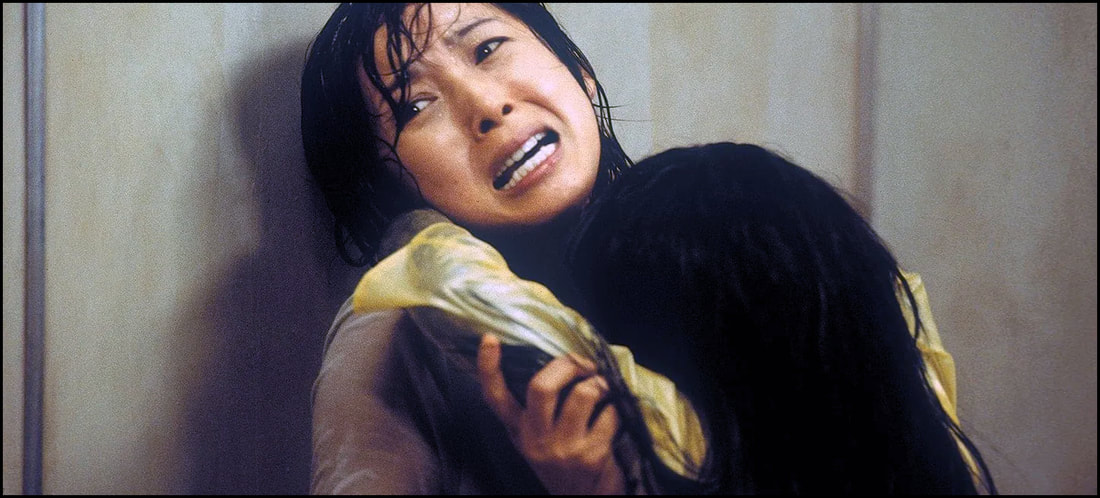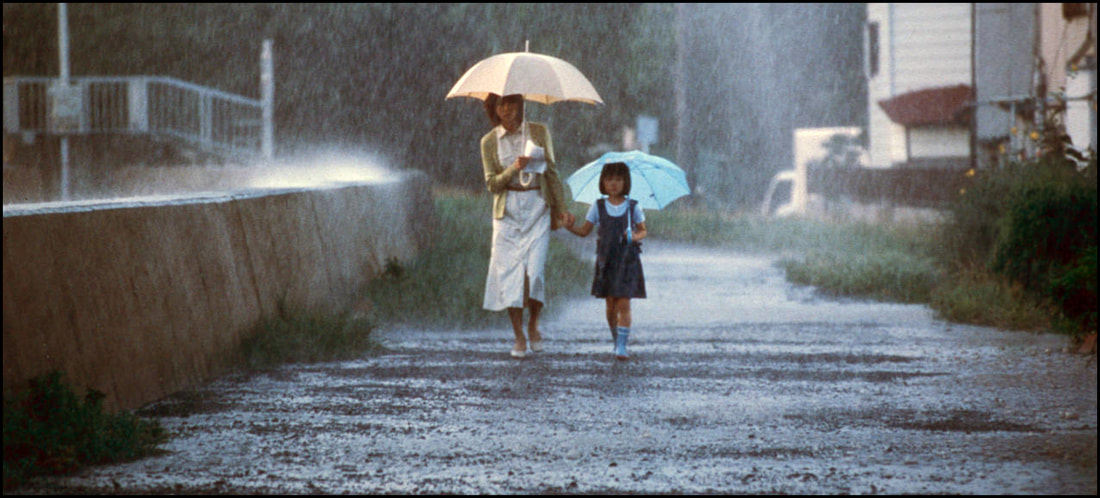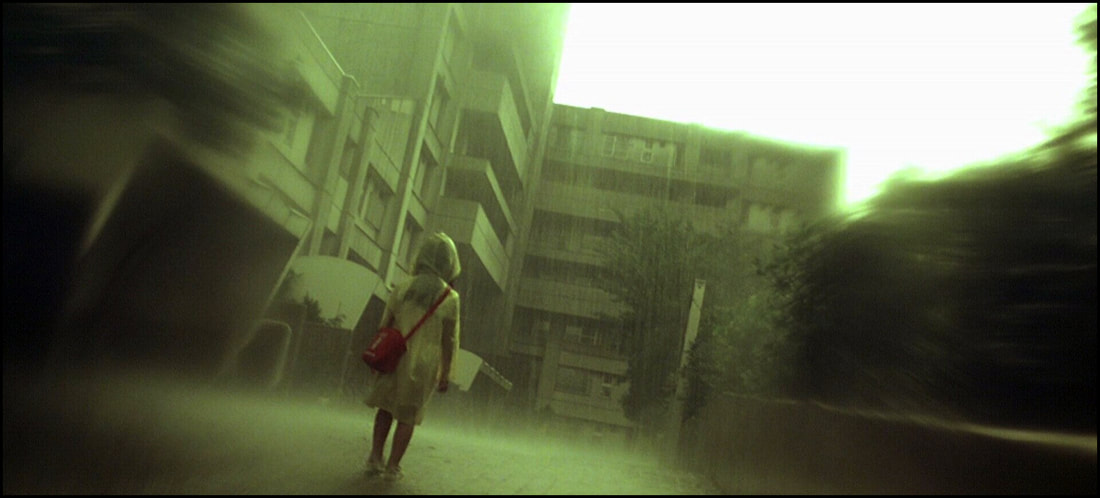From the film’s IMDB.com page citation:
“A mother and her 6-year-old daughter move into a creepy apartment whose every surface is permeated by water.”
Folks, confession time: I feel old this afternoon.
No, no, and no: I’m not letting it get me down. But the whole reason that I raise this self-reflection is that I’ve been writing about film and media so long that I’m finally getting around to revisiting re-releases that I penned reviews on the first time I saw them promotionally … and that really hasn’t been all that long. What this means is that back in the day when a little something-something like Dark Water enjoyed its first U.S. release on home video, I was there. I was offered a complimentary DVD by a distributor. And I happily watched and wrote my observations down for posterity’s sake. Although they might be presently lost to history (curse you, Amazon.com), I do recall a bit of what I said back then, and – to my credit – I’m pretty much standing by those original impressions.
That said, Dark Water is a very, very, very good atmospheric Horror/Fantasy.
Directed for the screen by the award-winning Hideo Nakata – the talented director and writer and producer who has some of the finest contemporary frights to emerge from Japan – Water is a slow-moving meditation on life, the universe, what’s in between, and what very well could lie beyond. As a storyteller, he’s quite possibly forgotten more about scaring audiences silly than some ever learn; and it’s his technical proficiency as both taking his sweet time to set the stage and then successfully deliver on the resulting promise that gives this film so much of its beating heart. Mind you: it’s imperfect – some sequences just simply stretch on languorously for no significant reason – but that doesn’t even remotely reduce its effectiveness as a thriller.
In the middle of a complicated divorce, Yoshimi Matsubara (played by the lovely Hitomi Kuroki) is doing everything she possibly can to keep sole custody of her young daughter Ikuko (Rio Kanno). Barely winning out in the custody fight, she’s forced to enroll her child in a new school while also navigating the work world, returning back to employment after leaving her job as a publishing editor in order to start the family. Now, all she can afford is a two-bedroom apartment in a rundown part of the big city.
How can matters get worse?
Clearly, this failed low-rise apartment building has seen better days. From the outside, it’s obviously not been kept up; and rarely are we shown the residents coming and going about their daily tasks, heavily implying that perhaps smarter minds have sought refuge elsewhere. It’s empty. It’s poorly lit. It’s decrepit. And – most importantly – there’s water everywhere. Dripping from the ceilings. Lining the corners of the hallway. Even resting in small puddles in the solitary elevator.
From what I’ve read, the presence of water has been used symbolically to tie in with a good deal of Japanese ghost stories. Though it’s often been used to represent purification, Dark Water employs it as a metaphor for ‘the unholy,’ often times depicting it mildly discolored or even secretly hiding hair, mud, and general muck. Instead of flowing freely as it might in nature, these streams bubble and wretch when required; and it’s often shown drip, drip, dripping from discolored patches of mold-infested ceilings. Because it exists seemingly everywhere, it’s a pitch perfect symbolization of the supernatural presence of a ghost that can go anywhere and do anything … as audiences are about to see at the end of its 100-minute running time.
With a slim cast all wrapped up in about as dour an atmosphere that’s even represented Japanese suburbia, Dark Water establishes its own spiritual trinity of the Mother (Yoshimi), the Daughter (Ikuko), and the Unholy Ghost (the spectral remains of Mitsuko Kawai). These three souls – two living, one dead – are wrapped together in existential peril, all of it revolving around ideas of parental responsibility, social stability, privacy rights, gender roles, and even a smattering more. Granted, some of that may sound a bit absurd for a conventional Horror film, but that’s where Water is its own sleight of hand: it winds up being more about a mother’s love than it is a roller coaster ride of ghostly delights.
As Fate would have it, Yoshimi grew up with her own issues, not the least of which involved some absent parents, and she’s emerged as a broken woman as a consequence. Whether from her own actions or not, her marriage has failed; and she clings to her daughter more so out of a desire to give her a childhood unlike hers more than (perhaps) out of authentic love. The deceased Mitsuko shares this in common with Yoshimi (there are suggestions that she was abandoned), and – despite how vigorously the grown woman tries to fend for her own flesh-and-blood Ikuko – it eventually becomes clear that Mitsuko desires a mother more than she does another of her own age. This misdirection holds until the last reel at which point Yoshimi is forced to choose between the two worlds, and – dare I say? – it might not be that which most viewers expect.
As good as Dark Water is at times, it’s equally a slog, not unlike dragging one’s legs through a dirty lakebed. Nakata packs the film with long and slow-moving sequences – unnecessarily slow at a lot of times – all because he’s likely convinced that it’s building more and more atmosphere despite the fact that … well … we already get it. These folks are cursed, respectively, and a bit of doom – even one with a seemingly happy ending – awaits them all. While the flick is thankfully light on jump scares, the director does cleverly slip in sections that heavily imply something more is taking place, leaving the viewer to decide whether or not it’s applicable or merely a bit of creative misdirection. There’s probably a vastly more appreciated cut of this one out there – one that would trim at least ten minutes of quiet times – but, if this is all we get, it’ll have to do for the time being.
Perhaps the best device in all of this is the fact that the long absent Mitsuko had a prized red knapsack – the kind of things young girls carry everywhere – that keeps showing up where it’s expected least. Like a constant reminder that not everything we see is real, that pack helps to guide Yoshimi and her daughter on this journey. Like any living thing, it refuses to disappear into the ether. It can’t be thrown out. It can’t be destroyed. Until it’s back where it was always supposed to be, it’ll be as constant as the setting sun … a pervasive reminder that nothing is ever truly lost if we keep looking for it.
- DOLBY VISION/HDR PRESENTATION OF THE FILM
- Original lossless 5.1 DTS-HD Master Audio
- Optional English subtitles
- Ghosts, Rings and Water - interview with director Hideo Nakata
- Family Terrors - interview with author Koji Suzuki
- Visualizing Horror - interview with cinematographer Junichiro Hayashi
- Archive interviews with actors Hitomi Kuroki & Asami Mizukawa and theme song artist Shikao Suga
- Original 'making-of' documentary
- Trailers and TV Spots
- Reversible sleeve featuring original and newly commissioned artwork by Peter Strain
- Illustrated collector's booklet featuring writing on the film by David Kalat and Michael Gingold
Recommended.
At the heart of Dark Water (2002), there’s a great ghost story. However, the narrative is structured with bookends involving some flawed mother/daughter relationships that, debatably, slows the picture down to a crawl in a few inopportune moments. While my opinion over how well (or how poorly) the human drama is handled might be in the minority, I’m still perfectly okay with suggesting Water crafts solid atmosphere as a spectral chiller – maybe even more than was necessary – and deserves the praise its received over the years. I just wish it moved a bit faster, especially given the fact that its true theatrical scares are few and far between.
In the interests of fairness, I’m pleased to disclose that the fine folks at Arrow Films provided me with a complimentary Blu-ray copy of Dark Water (2002) by request for the expressed purpose of completing this review. Their contribution to me in no way, shape, or form influenced my opinion of it.
-- EZ




 RSS Feed
RSS Feed